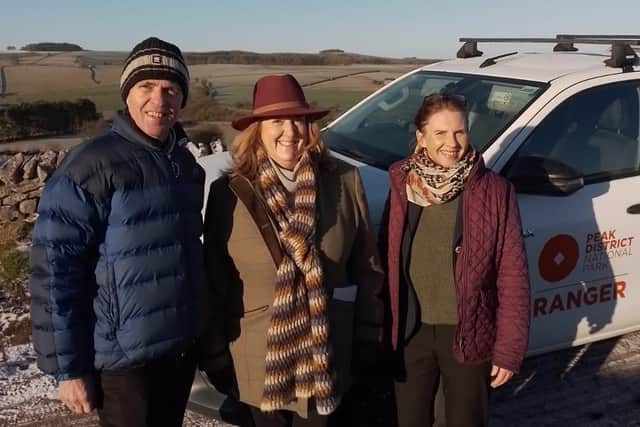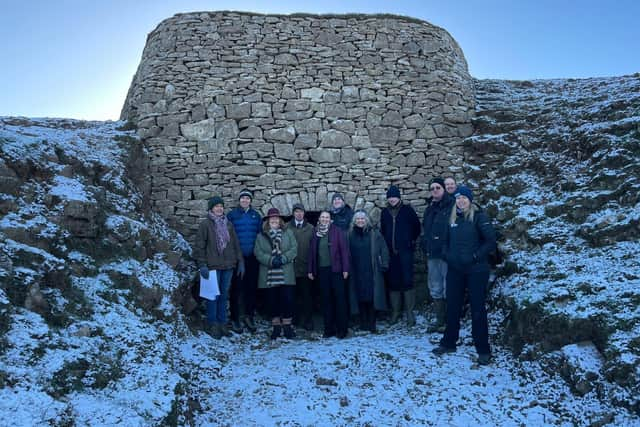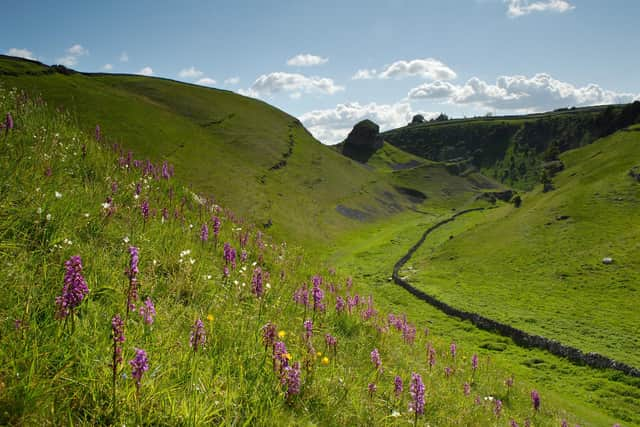National parks minister visits Peak District for update on farming landscapes conservation programme
This article contains affiliate links. We may earn a small commission on items purchased through this article, but that does not affect our editorial judgement.
and live on Freeview channel 276
Trudy Harrison, Minister for Natural Environment and Land Use, was welcomed to the White Peak by Derbyshire Dales MP Sarah Dines and senior staff from the Peak District National Park Authority (PDNPA) for a tour of projects funded by the national Farming in Protected Landscapes (FiPL) programme.
PDNPA is currently developing around 150 FiPL initiatives, ranging from farm business diversification to habitat restoration, with more than £2.3million expected to be invested through the programme in the Peak District by March 2024.
Advertisement
Hide AdAdvertisement
Hide AdMs Harrison said: “It’s hugely rewarding to come to the Peak District to see first-hand the impact our Farming in Protected Landscapes programme is having on rural communities.


"We know that national parks such as the Peak District will be pivotal in meeting our international commitment to protect 30 per cent of land for biodiversity by 2030. FiPL shows how thriving nature-friendly businesses can improve nature, and people’s access to it, while complementing the special character of our protected landscapes.”
She added: “I will continue to work with the national park as well as the many stakeholders to manage the interdependent challenges of protecting our natural environment whilst ensuring access for all, support for farmers and growth of rural economies.”
Alongside practical projects on the ground, the minister was introduced to the unique environment of the eastern White Peak, where exposed uplands belie a landscape that is often significantly more agriculturally productive than other parts of the Peak District.
Advertisement
Hide AdAdvertisement
Hide AdAfter a farm visit and meetings with community representatives, the minister was taken to a recently restored lime kiln at Minninglow where she heard how access improvements, tree planting and changes in land management are contributing to the enhancement and safeguarding of local landscape character as well as supporting nature recovery efforts.


PDNPA chair Andrew McCloy, who was among the touring party, said: “The FiPL programme has been particularly welcome in providing an opportunity for us to engage with farmers and landowners who may not have had the confidence or detailed knowledge to undertake projects like this in the past, whether that be in cultural heritage, trialling new land management approaches or telling their story as part of welcoming visitors to the park.
“We are already seeing the fruits of the first 18 months of individual project delivery, and our teams at the national park remain almost uniquely placed to offer the expertise and intimate understanding of the Peak District landscape to drive the success that the FiPL scheme can offer
As well as discussions with PDNPA’s chief executive Phil Mulligan and Visit Peak District chair Richard Fitzherbert, the minister also made time for a conversation with visitors to the High Peak Trail, who were enjoying use of personally-adapted mobility bikes on the traffic-free, all user route.
Advertisement
Hide AdAdvertisement
Hide AdThe authority itself is preparing to introduce new equipment at its own bike hire centres in early 2023, which will mean more people with a range of mobility challenges can gain health and wellbeing benefits from being outdoors in the national park landscape.


Other projects to have benefitted from FiPL funding include the planting of new trees and boundary hedges at Bubnell Cliff farm on the Chatsworth estate, where managers will also be sowing grazing land with a more diverse mixture of grasses, legumes and herbs to improve livestock health and soil fertility.
Funding for Bubnell Cliff will additionally support the development of 45 hectares of wood pasture linking areas of ancient woodland, and the restoration of a building historically used for storing ashes.
Elsewhere, a grant of £24,160 to the Wye Valley environmental volunteer group OK Connect will facilitate partnership working between local naturalists and farmers to address a critical shortage of lack of nesting sites for barn owls and kestrels – in part due to ash die-back. The project has seen great uptake, with the first year’s boxes already allocated to over 30 landowners who have signed up.
Advertisement
Hide AdAdvertisement
Hide AdFiPL money has has also funded six new paths enabling access to flower-rich hay meadows and mining sites at Sheldon and Sough Top near Taddington, land above Castleton and an important link to Lathkilldale National Nature Reserve, as well as resurfacing the bridlepath above Ladybower.
The biggest grant awarded locally, £111,099, will be used to purchase a specialist all-terrain vehicle for wildfire management.
A £48,000 grant has also been used to establish a new farmer-led group intended to foster a more collaborative approach to managing the White Peak, which already has almost 130 members and has begun hosting regular educational events.
Reflecting on the breadth and diversity of the FiPL’s impact, Ms Dines said: “I was delighted to invite Trudy Harrison MP to visit beautiful Derbyshire Dales. We were able to view our stunning Peak District countryside and to discuss the challenges facing those farmers in the White Peak who are committed to producing great food and to enhancing our natural world.
Advertisement
Hide AdAdvertisement
Hide Ad“The farmers’ enthusiasm for driving forward was evident and we were also able to view an excellent project of a lime kiln restoration. The mixture of our industrial heritage, the natural world and farming is very special and is what makes the working Peak District so unique.”
She added: “Kick-starting new and sustainable farming businesses is also a key part of the FiPL programme, with several projects already underway across the Peak District including pop-up campsites, shepherd hut accommodation, butchery facilities and improved educational access for schools and young people to the farm landscape.”
For details of all those landowners and projects allocated funding so far, go to https://bit.ly/3PMoWcE.